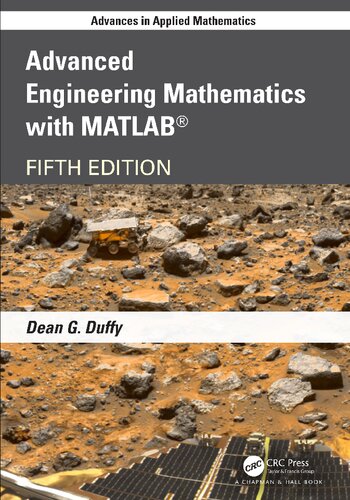

Most ebook files are in PDF format, so you can easily read them using various software such as Foxit Reader or directly on the Google Chrome browser.
Some ebook files are released by publishers in other formats such as .awz, .mobi, .epub, .fb2, etc. You may need to install specific software to read these formats on mobile/PC, such as Calibre.
Please read the tutorial at this link: https://ebookbell.com/faq
We offer FREE conversion to the popular formats you request; however, this may take some time. Therefore, right after payment, please email us, and we will try to provide the service as quickly as possible.
For some exceptional file formats or broken links (if any), please refrain from opening any disputes. Instead, email us first, and we will try to assist within a maximum of 6 hours.
EbookBell Team

5.0
108 reviewsIn the four previous editions the author presented a text firmly grounded in the mathematics that engineers and scientists must understand and know how to use. Tapping into decades of teaching at the US Navy Academy and the US Military Academy and serving for twenty-five years at (NASA) Goddard Space Flight, he combines a teaching and practical experience that is rare among authors of advanced engineering mathematics books.
This edition offers a smaller, easier to read, and useful version of this classic textbook. While competing textbooks continue to grow, the book presents a slimmer, more concise option. Instructors and students alike are rejecting the encyclopedic tome with its higher and higher price aimed at undergraduates.
To assist in the choice of topics included in this new edition, the author reviewed the syllabi of various engineering mathematics courses that are taught at a wide variety of schools. Due to time constraints an instructor can select perhaps 3 to 4 topics from the book, the most likely being ordinary differential equations, Laplace transforms, Fourier series and separation of variables to solve the wave, heat, or Laplace's equation. Laplace transforms are occasionally replaced by linear algebra or vector calculus.
Sturm-Liouville problem and special functions (Legendre and Bessel functions) are included for completeness. Topics such as z-transforms and complex variables are now offered in a companion book, Advanced Engineering Mathematics: A Second Course by the same author.
MATLAB is still employed to reinforce the concepts that are taught. Of course, this Edition continues to offer a wealth of examples and applications from the scientific and engineering literature, a highlight of previous editions. Worked solutions are given in the back of the book.